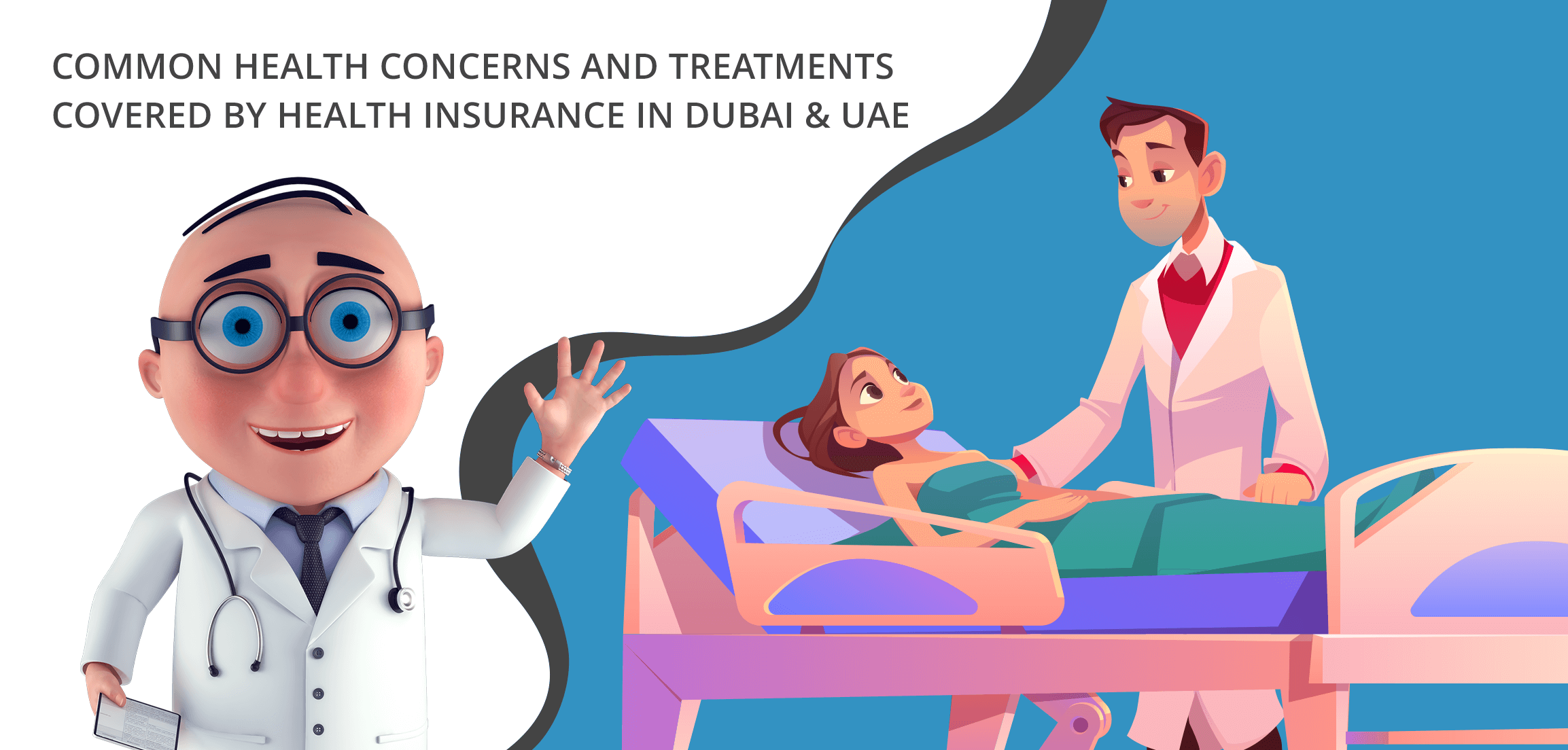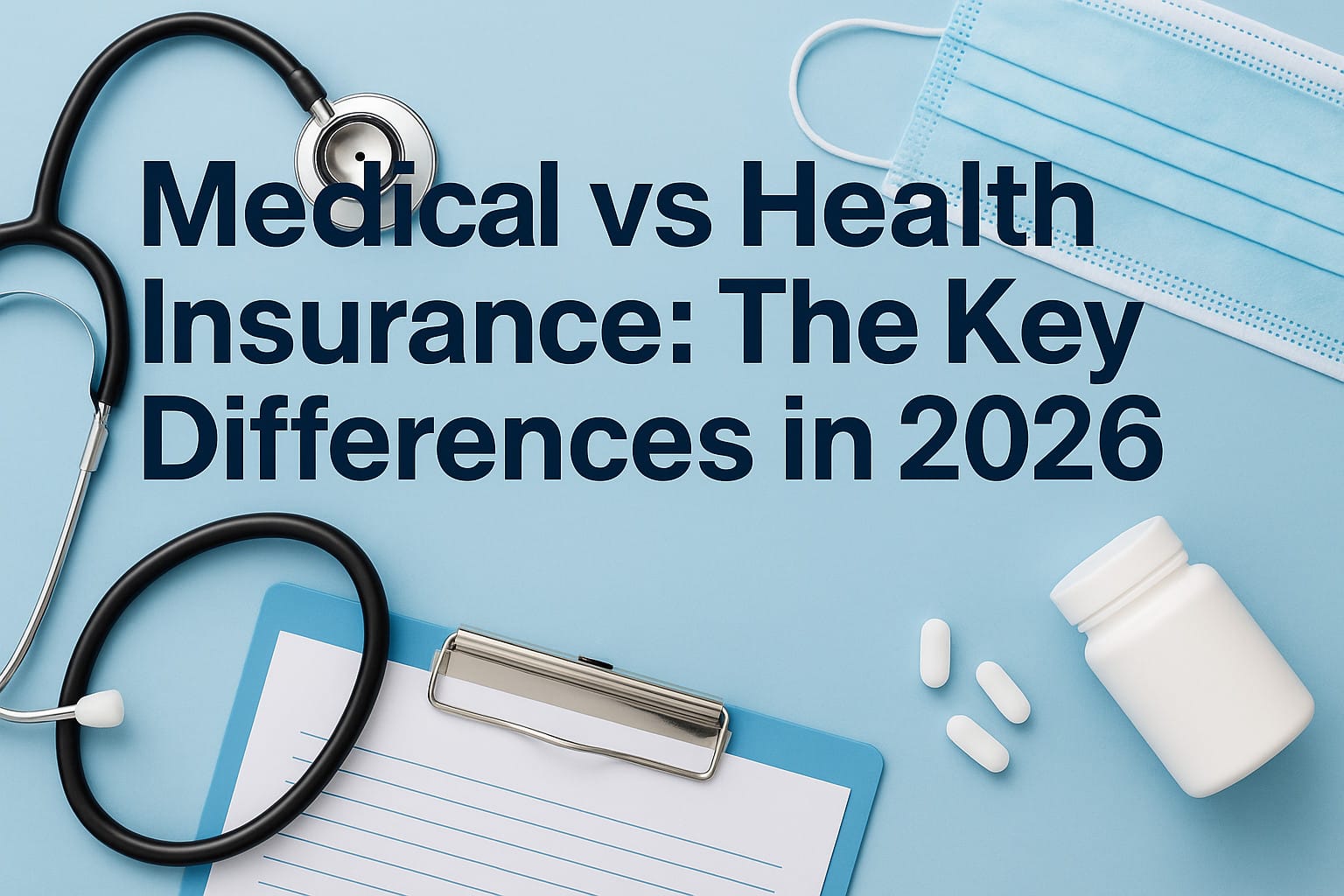If you’re living in the UAE, it’s important to have health insurance to protect yourself from the high costs of medical treatment.
Fortunately, all insurance plans in the UAE, including Dubai, cover a minimum set of benefits that are required by the Dubai Health Authority. Additionally, all expatriate visa holders are entitled to almost the same benefits, with a few exclusions.
In this blog, we’ll go over the common health concerns and treatments covered by health insurance in the UAE.
What Are Some Common Health Concerns in Dubai & UAE?
Living in the UAE comes with factors that may cause some health concerns as the region is known for its extreme weather conditions and heat.
Here are some of the common illnesses you may come across:
Heat-related illnesses: The UAE region is known for its hot and humid climate, especially during the summer months.This can lead to:
- heat exhaustion
- heat stroke
- other heat-related illnesses
These are common for those who work outdoors or engage in strenuous physical activity.
It’s important to stay hydrated, avoid prolonged exposure to the sun, and take breaks in air-conditioned spaces when possible.
Respiratory problems: The air quality in some parts of the UAE region can be poor due to pollution, sandstorms and dust.This can exacerbate respiratory problems such as asthma and allergies.
It’s important to monitor air quality levels and take necessary precautions, such as wearing a mask when outside or avoiding outdoor activities during times of high pollution.
Cardiovascular disease: Cardiovascular disease is a leading cause of death in the GCC region, with risk factors including high rates of obesity, diabetes, and hypertension.It’s important to maintain a healthy diet, exercise regularly, and manage any underlying medical conditions to reduce the risk of cardiovascular disease.
Mental health: Living in a new and unfamiliar environment can also take a toll on one’s mental health, especially if you are far away from family and friends.
It’s important to seek support and resources if needed, such as counselling services or joining social groups to connect with others.
While we have discussed some of the most common health concerns in the region, let’s have a look at what are the benefits and treatments that can be covered by Health Insurance in the UAE.
What are the Treatments Covered By Health Insurance in Dubai & UAE?
Every Emirate in the UAE has health regulators that decide on the minimum stipulated benefits that are required for every health insurance policy. These plans are known as Basic Plans.
In Dubai, we have DHA (Dubai Health Authority) as the regulator and its take on basic coverage for Health Insurance is known as Essential Benefits Plan or EBP.
Let’s have a look at the details of health insurance in the UAE:
Basic Benefits and Treatments Covered
The basic benefits covered by health insurance in the UAE include:
- Emergency treatments
- Consultations and admissions
- Pre-existing and chronic conditions (which must be declared upon application and are subject to medical underwriting)
- Medicine as per the DHA approved formulary drug list
- Diagnostics such as X-rays, MRI, CT-scans, and lab tests
- Vaccinations for children up to 6 years old
- Physiotherapy
- Maternity care for married females (conditions for the cover period apply depending on the insurer)
- Referrals to other Doctors and Approvals as well
However, it’s important to note that all of these benefits are subject to annual aggregate limits or sub-limits, referrals and approvals as well, which vary from one insurer to the other.
EBP benefits are the same for all insurers. They would only differ if and when they enhance the set of benefits which will categorise the plan as enhanced or comprehensive.
In addition to the basic benefits, higher and more comprehensive insurance plans may include additional benefits such as:
- Dental care
- Optical care
- Alternative medicine
- Higher sub-limits for some of the basic benefits, and even a lesser or nil-copayment for certain treatments
- Direct access to a wider range of medical facilities
However, it’s important to remember that benefits can always vary from one insurer to the other.
Comprehensive Plans:-
Some common health concerns may be covered by health insurance in the UAE.
They may include cover for:
- Cardiovascular disease
- Diabetes
- Respiratory disease
- Cancer
- Mental health
The specific treatments that are covered will depend on the individual health insurance plan and the insurer. For example, some insurance plans may cover surgery and hospitalisation, while others may only cover medication or outpatient care.
Premiums for such comprehensive plans may be higher depending on the level of coverage we choose.
What are the Treatments That Are Not Covered Under Health Insurance?
When it comes to medical treatment and health insurance coverage, it’s important to keep in mind that treatments required are subject to terms of benefits and should not be part of the standard DHA exclusions list.
Common Exclusions/Treatments can be:
- All expenses relating to dental treatment, dental prostheses, and orthodontic treatments
- Hearing and vision aids, and vision correction by surgeries and laser
- Care for the sake of travelling
- Surgical and non-surgical treatment for obesity (including morbid obesity), and any other weight control programs, services, or supplies
- Healthcare services and associated expenses for the treatment of alopecia, baldness, hair falling, dandruff or wigs
- Treatments and services arising as a result of hazardous activities, including but not limited to, any form of aerial flight, any kind of power-vehicle race, water sports, winter sports, horse riding activities, mountaineering activities, violent sports such as judo, boxing, and wrestling, bungee jumping and any professional sports activities.
- Healthcare services and treatments by acupuncture, acupressure, hypnotism, massage therapy, aromatherapy, ozone therapy, homoeopathic treatments, and all forms of treatment by alternative medicine.
It’s important to carefully review the terms of your insurance plan to understand what is and is not covered as each Insurer may not cover certain conditions for treatments and medications.
What are Annual Aggregate Limits of The Policy?
The annual aggregate limit is the maximum amount of money that the insurance company will pay out for all of your covered medical expenses in a single year. This limit is set by the insurance company and can vary from one insurer to another.
All the benefits mentioned in the above bullet points are subject to this annual aggregate limit, which means that once you reach this limit, you will have to pay out of your own pocket for any additional medical expenses.
As part of the annual aggregate limit, certain benefits may also have sub-limits, which are limits on the amount of money that the insurance company will pay for a specific type of treatment or service. This means that once you reach the sub-limit, you will have to pay for any additional expenses related to that specific benefit out of pocket irrespective of the remaining annual aggregate limit.
Example:
- Let’s say that your insurer’s annual aggregate limit is AED 150,000
- Your insurance plan covers physiotherapy
- Terms and conditions with the chosen insurer for Physiotherapy has a sub-limit of AED 5000 or up to 10 sessions in a year.
- If you avail this benefit where the cost per session is AED 700, as per the terms and conditions, you can avail up to 7 sessions of Physiotherapy, in turn utilising AED 4900 out of the AED 5000 sub-limit amount.
- In turn you would also utilise AED 4900 out of the annual aggregate limit of AED 150,000 leaving you with AED 145,100 for the rest of the policy period.
- If you want to avail of more Physiotherapy sessions, then you would have to pay for all the additional sessions from your own pocket.
Hence It’s important to review the details of your insurance plan carefully, including the annual aggregate limit, sub-limits, and any other restrictions or exclusions that may apply, so that you are aware of what is covered and what is not.
This will help you to make informed decisions about your healthcare and avoid any unexpected expenses.
In Summary
It’s important to note that while all health insurance plans in the UAE cover a minimum set of benefits, the specific benefits and coverage limits can vary significantly from one plan to the other.
You may also check with the insurer to add on certain benefits or include them with an additional premium amount that you would have to pay the insurer to cover in the case of comprehensive plans.
In conclusion, having health insurance coverage is very essential for protecting yourself from the high costs of medical treatment in the UAE. It is important to carefully review the terms of your plan to understand what is covered and what is not. By doing so, you can ensure that you have the coverage you need to stay healthy and receive the medical treatment you require in the times of need.







